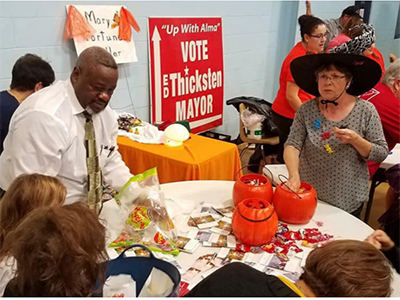In 2018, Doug Phillips participated in the Community Development Institute at the University of Central Arkansas in Conway. One thing he took away from it is how churches can't help with community development -- or help with economic development -- if the town is not connected.
"I started looking around our neighborhood, and in the downtown area of Alma; it is depressed, disjointed and disconnected," Phillips said. "Our streets are in bad shape, and our sidewalks are in bad shape.
"The city was making a big multi-million investment for downtown but had nothing happening downtown. With our church, being situated where it is, it is our obligation to help the community start bringing people together in this area."
Phillips is the senior pastor at Alma First United Methodist Church and Kibler United Methodist Church. Together with area businesses, such as the local downtown library as well as the city's chamber of commerce and other investors, was able to organize one of the city's largest fall festivals last year.
 |
| Volunteers from the church and city help pass out candy to people at the Alma fall festival, held at Alma UMC. Photo by Alma UMC |
"We had so many churches, probably 15 or more churches that came out, as well as several businesses," Phillips said. "We just had so much diversity that night and so much fun – I didn't realize the community had been so disjointed – but we were able to do something big.
"It was a really cool thing to see."
The church and the city partnered for the first-ever Liberty Festival, which took place last Summer at Alma Lake and Park.
"… The problem is, churches, businesses and city departments even, feel like they are competing against each other. Churches are competing for people, and they do different events and fundraisers, but we are pulling from the same group of folks.
"For our fall festival, we relied on the generosity of others. They saw something that was equitable and an enjoyable event and something they could use to help promote their business or church. We weren't competing that night."
"We have had more participation than the fall festival," he said. "People see that we aren't competing but see it as an opportunity to promote themselves, right along with everyone else."
For example, Phillips said one day he was sitting in his office, struggling to figure out how he was going to promote the Liberty Festival, when he received a phone call from a local advertising company.
"He came up with sponsorship packages, T-shirts, and marketing information, and he did this pro-bono," Phillips said. "He lives in Alma, and he believes in what we are doing. He did it not to promote his business, but to promote his town, because he loves his community.
Jessica Blassingame is the administrative assistant at Alma FUMC and her husband, Larry, has lived in the city his entire life. She said it took someone like Phillips to finally put events like these in motion.
He said Alma's population is between 4,000 to 5,000, and he estimated there were close to 3,000 people in attendance at the event.
"The largest part of our downtown is impoverished," Phillips said. "So we had some who walked across the road to get there, get food or candy and have fun. There was nothing there they had to buy – sodas, popcorn, games – it was all free."
"I think everyone in my church is trying to communicate the same message," he said. "We do this because we are living our faith; this is something we were called to do. "There is no doubt there are miraculous things here."
excerpt from a story by Sam Pierce, featured contributor, The Arkansas United Methodist magazine
This story represents how United Methodist local churches through their Annual Conferences are living as Vital Congregations. A vital congregation is the body of Christ making and engaging disciples for the transformation of the world. Vital congregations are shaped by and witnessed through four focus areas: calling and shaping principled Christian leaders; creating and sustaining new places for new people; ministries with poor people and communities; and abundant health for all.





